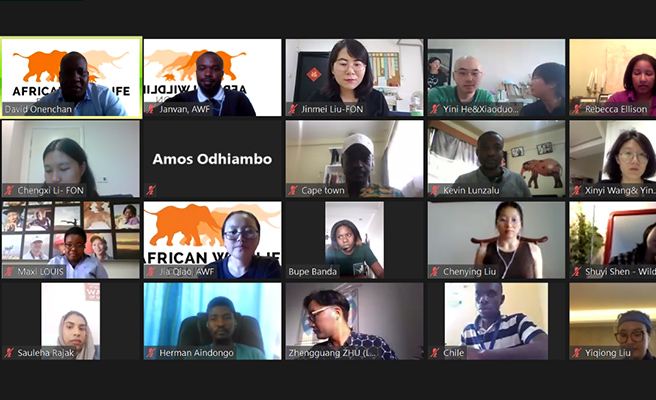China-Africa Youth Dialogues connect conservation champions

Supporting youth action in the conservation agenda has been a priority for African Wildlife Foundation since the organization was founded in 1961. AWF established the Mweka College of African Wildlife Management in Tanzania, kickstarting the careers of East Africa’s rangers, wildlife managers, and scientists. History has shown that the collective effort of young people — whether as students, professionals, or conservation practitioners — is a force of positive change.
Africa is the youngest continent. In 2019, people under the age of 25 comprised 60 percent of the African population. With the necessary investments in education and job-creation, the youth could lead innovation and economic growth in many African countries. While the opportunities are numerous, this substantial demographic is also the most affected by the decisions today’s leaders make.
Like the rest of the world, the African continent is predicted to undergo dramatic loss of biodiversity if the current rates and practices of unsustainable natural resource use are not moderated. Young Africans ought to be at the forefront in national, regional and global conversations to ensure that they can develop solutions for global challenges like climate change and biodiversity loss but also emerging crises like the COVID-19 pandemic.
Recognizing the need to continuously engage the youth in discussions and initiatives to build a future where human and natural biodiversity can peacefully co-exist, AWF has supported African youth networks in Kenya, Uganda, Zimbabwe and Cameroon. In May 2019, AWF worked with World Wildlife Foundation to host the ‘I AM FOR NATURE’ Youth Summit at AWF headquarters where the ‘Africa Youth Declaration on Nature’ was born, as well as the ‘Africa Youth for Nature Network’. This year the Africa Alliance of YMCAs, AWF, World Organization of the Scout Movement, Africa Region, and WWF have come together to recognize the first Top 100 African young conservation leaders.
Inspiring African wildlife advocates in China
For long-term success, youth initiatives must extend across country boundaries and even continents. AWF has also partnered with Friends of Nature to develop the China-Africa Youth Dialogue series designed to create new connections between empowered and inspired champions for conservation from Africa and China. In three interactive and specially themed sessions, the series of webinars provides a platform for young people from various fields and backgrounds to share experiences on the state of biodiversity in their contexts and discuss the role that young people can play to mitigate environmental challenges.
Established in 1993, Friends of Nature is the first nation-wide, environmental grassroots NGO in China. Since its inception, Friends of Nature has registered over 30,000 volunteers across the country, united to conserve one of the most valuable biodiversity hotpots in the world, home to unique ecosystems, species and genetic resources. Friends of Nature is also committed to public engagement to reduce the loss of wild species and their habitats, mobilizing citizens through environmental education and advocating for improved environmental legislation.
The first China-Africa Youth Dialogue on August 28, 2020 explored the interface between biodiversity and climate change. Titled ‘Building a future that the youth desire, where human and natural biodiversity can peacefully co-exist,’ the webinar drew Chinese and African participants from universities and environmental institutions.
The next webinar in the series took place on October 30, 2020, highlighting the benefits of sustainable wildlife economies. In light of the COVID-19 pandemic, the topic is timely. The zoonotic disease has exposed the unsustainable relationship between humans and nature. In particular, the webinar focused on sustainable wildlife trade. Panelists shared insight on the benefits of equitable governance systems for natural resource use. Additionally, the webinar tackled the complex industry of wildlife poaching and trafficking, showing how elephants, rhinos, tigers, pangolins, and a host of lower-profile species of plants and animals face serious threats due to uncontrolled or illegal trade.

The first webinar in the China-Africa Youth Dialogue focused on the role youth can play in biodiversity conservation
Representing youth voices at international conventions
The China-Africa Youth Dialogue helps mobilize African and Chinese youth perspectives towards the Convention on Biological Diversity processes and the Post-2020 Global Biodiversity Framework, which marks the next decade of conservation. To facilitate youth involvement in the convention, AWF has engaged African youth in a series of consultative meetings in Kenya, Uganda, Zimbabwe, and Cameroon in collaboration with the Global Youth Biodiversity Network. Similarly, Friends of Nature has worked with Japan Youth Biodiversity Network and held two China-Japan Youth Biodiversity Exchange Workshops, to strengthen the connection between Chinese and Japanese youth.
AWF applauds the Post-2020 Global Biodiversity Framework for highlighting rights-based approaches, equitable benefit-sharing, and the participation of indigenous peoples and local communities. In tandem with our efforts to mobilize young conservationists, AWF facilitated cooperation between China and African governments. We support the alliance of African member countries mandated by national ministers, known as the African Group of Negotiators, to unify the African voice ahead of the Convention on Biological Diversity Conference of Parties in 2021. These mechanisms and relationships set the standard for natural resource management, wildlife conservation, and habitat restoration.